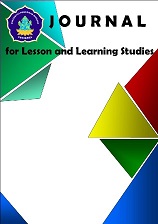Professional Competence of Indonesian Language Teachers in Senior High Schools: Perspectives of Senior High School Students
DOI:
https://doi.org/10.23887/jlls.v7i3.88174Kata Kunci:
Indonesian Language, Effectiveness, Learning, Professional Competence, Language TeacherAbstrak
The current problem is the lack of interest of students to enter Indonesian language colleges. There are 67.70% do not understand the meaning of Indonesian, 75.45% are less interested in majoring in Indonesian. There is a gap between expectations and reality in the field. The purpose of the study was to analyse the relationship between teacher knowledge and student understanding in the learning process. Quantitative method with survey type. The research sample was 756 people. The sampling technique was random sampling. Data collection technique with instruments. The instrument has been developed and is valid with a total of 80 items. The instrument is assessed on a Likert Scale of 1-5 points. The instrument is distributed using a google link from. The analysis technique with descriptive statistics with the help of SPSS Version 29.0 by looking at the mean, percentage, standard deviation and seeing the relationship. The results found that the level of knowledge and understanding of teachers regarding Indonesian language lesson content is in the high category. It was also found that the relationship between Indonesian language teacher competence in understanding and knowledge is in the high and significant category and in mastering Indonesian language learning content in high schools. The conclusion is that the professional competence of teachers is good, but in its implementation, it is still minimal.
Diterbitkan
Cara Mengutip
Terbitan
Bagian
Lisensi
Hak Cipta (c) 2024 Nur Khadijah Razak, Andi Nurfaizah, Sri Rahayu

Artikel ini berlisensiCreative Commons Attribution-ShareAlike 4.0 International License.
Authors who publish with the Journal for Lesson and Learning Studies agree to the following terms:
- Authors retain copyright and grant the journal the right of first publication with the work simultaneously licensed under a Creative Commons Attribution License (CC BY-SA 4.0) that allows others to share the work with an acknowledgment of the work's authorship and initial publication in this journal.
- Authors are able to enter into separate, additional contractual arrangements for the non-exclusive distribution of the journal's published version of the work (e.g., post it to an institutional repository or publish it in a book), with an acknowledgment of its initial publication in this journal.
- Authors are permitted and encouraged to post their work online (e.g., in institutional repositories or on their website) prior to and during the submission process, as it can lead to productive exchanges, as well as earlier and greater citation of published work. (See The Effect of Open Access)




